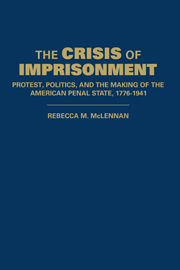Book contents
- Frontmatter
- Contents
- Acknowledgments
- Introduction: The Grounds of Legal Punishment
- 1 Strains of Servitude: Legal Punishment in the Early Republic
- 2 Due Convictions: Contractual Penal Servitude and Its Discontents, 1818–1865
- 3 Commerce upon the Throne: The Business of Imprisonment in Gilded Age America
- 4 Disciplining the State, Civilizing the Market: The Campaign to Abolish Contract Prison Labor
- 5 A Model Servitude: Prison Reform in the Early Progressive Era
- 6 Uses of the State: The Dialectics of Penal Reform in Early Progressive New York
- 7 American Bastille: Sing Sing and the Political Crisis of Imprisonment
- 8 Changing the Subject: The Metamorphosis of Prison Reform in the High Progressive Era
- 9 Laboratory of Social Justice: The New Penologists at Sing Sing, 1915–1917
- 10 Punishment without Labor: Toward the Modern Penal State
- Conclusion: On the Crises of Imprisonment
- Select Bibliography
- Index
1 - Strains of Servitude: Legal Punishment in the Early Republic
Published online by Cambridge University Press: 18 August 2009
- Frontmatter
- Contents
- Acknowledgments
- Introduction: The Grounds of Legal Punishment
- 1 Strains of Servitude: Legal Punishment in the Early Republic
- 2 Due Convictions: Contractual Penal Servitude and Its Discontents, 1818–1865
- 3 Commerce upon the Throne: The Business of Imprisonment in Gilded Age America
- 4 Disciplining the State, Civilizing the Market: The Campaign to Abolish Contract Prison Labor
- 5 A Model Servitude: Prison Reform in the Early Progressive Era
- 6 Uses of the State: The Dialectics of Penal Reform in Early Progressive New York
- 7 American Bastille: Sing Sing and the Political Crisis of Imprisonment
- 8 Changing the Subject: The Metamorphosis of Prison Reform in the High Progressive Era
- 9 Laboratory of Social Justice: The New Penologists at Sing Sing, 1915–1917
- 10 Punishment without Labor: Toward the Modern Penal State
- Conclusion: On the Crises of Imprisonment
- Select Bibliography
- Index
Summary
Neither slavery nor involuntary servitude, except as a punishment for crime whereof the party shall have been duly convicted, shall exist within the United States, or any place subject to their jurisdiction.
Thirteenth Amendment, §1, United States Constitution (1865)In historical scholarship and American collective memory alike, the Thirteenth Amendment is celebrated as the constitutional death notice of Southern chattel slavery. Ratified in 1865, as the Confederacy crumbled and four million slaves walked off the plantations, the Amendment recognized in law the practical destruction of slavery. That the Amendment proscribed chattel slavery of the sort that had flourished in the South for almost two centuries is incontrovertible; but that it was “an absolute declaration that slavery or involuntary servitude shall not exist in any part of the United States,” in Justice Joseph P. Bradley's oft-quoted phrase, is much less certain, for as well as pronouncing dead one kind of involuntary bondage, the Amendment breathed symbolic life into another. Slavery and involuntary servitude were prohibited, “except as a punishment for crime whereof the party shall have been duly convicted.” On its face, the Amendment declared penal varieties of slavery and involuntary servitude permissible; it made conviction for crime the sole grounds for the imposition of involuntary servitude on American soil, and exempted those “duly convicted” of crime from the otherwise universal prohibition on slavery and involuntary servitude.
- Type
- Chapter
- Information
- The Crisis of ImprisonmentProtest, Politics, and the Making of the American Penal State, 1776–1941, pp. 14 - 52Publisher: Cambridge University PressPrint publication year: 2008



